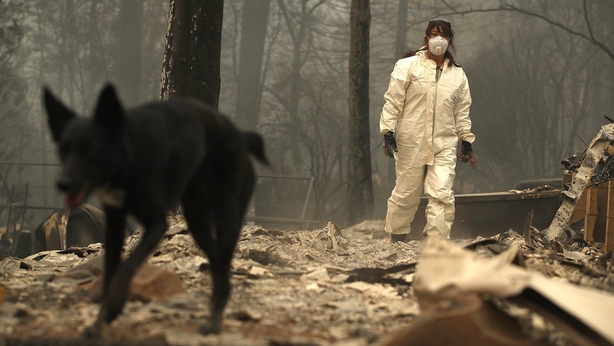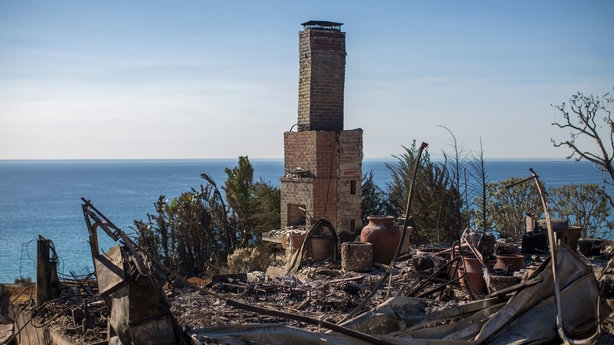US National Guard troops have joined the search for more victims in the ruins of a northern California town while the death toll climbed to 59 in the most deadly and destructive wildfire in the state's history.
The latest fatality count was announced as authorities released a revised list of 130 people reported missing after flames largely obliterated the Sierra foothills town of Paradise, about 280km north of San Francisco, last Thursday.
The majority on the list were over the age of 65.
Nearly 230 people were initially reported as missing in the blaze, dubbed the Camp Fire.
Most of those who remain unaccounted for are from Paradise, once home to 27,000 people.
More than 8,900 homes and other buildings burned to the ground in and around the town, and an estimated 50,000 people remained under evacuation orders in the area.
There has also been an outbreak of norovirus, a highly contagious gastrointestinal illness, at a shelter housing about 200 evacuees in the nearby city of Chico.

Public health agency spokeswoman Lisa Almaguer said that at least 20 people may have caught the virus.
The footprint of the six-day-old fire grew to 135,000 acres as of yesterday, even as diminished winds and rising humidity helped firefighters shore up containment lines around more than a third of the perimeter.
"This is one of the worst disasters I've seen in my career, hands down," Brock Long, head of the Federal Emergency Management Agency, told reporters in Chico.
"It looks like a war zone. It is a war zone," he said.
After visiting some of California's earlier wildfire zones in August, US Interior Secretary Ryan Zinke blamed "gross mismanagement of forests" because of timber harvest restrictions that he said were supported by "environmental terrorist groups."
The blaze, fuelled by thick, drought-desiccated scrub, has capped two back-to-back catastrophic wildfire seasons in California that scientists largely attribute to prolonged drought they say is symptomatic of climate change.
Lawyers for some of the victims claimed in a lawsuit filed that lax equipment maintenance by an electric utility was the proximate cause of the fire, which officially remains under investigation.
The Butte County disaster coincided with a flurry of blazes in southern California, most notably the Woolsey Fire, which has killed at least two people, destroyed more than 500 structures and displaced about 200,000 people in the mountains and foothills near the Malibu coast west of Los Angeles.
The Los Angeles County Sheriff's Department said the body of a possible third victim was found there in a burned-out dwelling.

Cal Fire officials said that blaze was 52% contained as of last night.
In Butte County, the search for more human remains continued as a National Guard contingent of 50 military police officers joined dozens of search-and-recovery workers and at least 22 cadaver dogs, Sheriff Kory Honea said.
The remains of eight more fire victims were found yesterday, raising the official number of fatalities to 59 - far exceeding the previous record from a single wildfire in California history - 29 people killed by the Griffith Park fire in Los Angeles in 1933.
The Camp Fire also stands as one of the deadliest US wildfires since the turn of the last century.
More than 80 people perished in the Big Burn firestorm that swept the Northern Rockies in August of 1910.
Butte County Sheriff's spokeswoman Megan McMann said the list of 130 missing would fluctuate from day to day as more names are added and others are removed, either because they turn up safe or end up identified among the dead.
Sheriff Honea invited relatives of the missing to provide DNA samples to compare against samples taken from newly recovered remains in hopes of speeding up identification of the dead.
But he acknowledged it was possible some of the missing might never be found.

